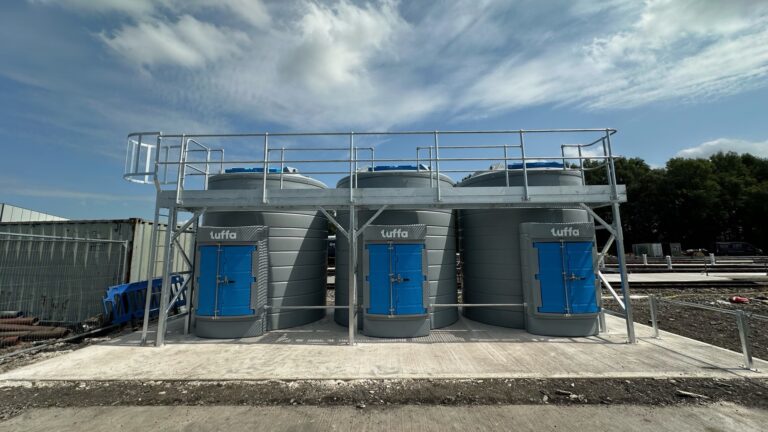
Diesel has traditionally been the fuel of choice for many trains, but with the move to greener alternatives, AdBlue® now plays a vital role in the reduction of nitrogen oxide emissions.
To support this transition, and ensure a seamless service provision, a 45,000 litre AdBlue® storage and dispensing facility has been installed at Arriva TrainCare’s maintenance depot at Crewe. This installation shows the company’s commitment to environmental sustainability as well as delivering improved train services.
Airquick Limited, rail depot plant and compressed air engineers based in Newark, designed, installed and commissioned the AdBlue® facility using a Tuffa storage solution. We spoke to Managing Director Richard Parsons to find out more about this project.
Project Overview and Objectives
What were the primary objectives for installing the 45,000 litre AdBlue storage tank?
Arriva TrainCare at Crewe provides overnight servicing for a wide range of train operators. New diesel-powered rolling stock invariably requires AdBlue® filling alongside refuelling every night, ready to return to service the following day. As an idea of the sheer volume required, 45,000 litres of AdBlue® would provide around one months’ worth of inventory for the depot. As such, the primary objective was to achieve the optimum storage capacity of AdBlue® to allow regular, uninterrupted servicing of the trains each night.
What were the specific challenges or needs?
Three Tuffa 15,000l self-bunded AdBlue® tanks were needed to achieve the required storage and these were located on a concrete base constructed by Serfis Construction (Stourbridge).
The delivery and subsequent installation of the tanks required close co-ordination between all stakeholders to enable this element of the project to be completed, particularly given some challenging site delivery and infrastructure limitations.
Project Details
Why these tanks?
The tanks were the largest that could be physically delivered to this site, and three were required to meet the desired capacity. Three 15,000l Tuffa tanks were considered the most economically advantageous way to deliver the customer’s required amount of total storage volume.
Were there any unique or innovative aspects of this installation?
Modern trains, such as the CAF Class 197 and Hitachi Class 805, require special couplings, not only for delivering the AdBlue®, but also to provide a signal to shut off the dispenser when the on-board tank is full.
The system is fully automatic, allowing multiple dispensers to operate at the same time with each of the three tanks fitted with two submersible pumps configured to operate in a duty/assist mode.
Each of the tanks is normally isolated from the dispenser distribution network and is automatically selected on demand based on the fluid level of each tank using a self-closing actuated valve.
Benefits and Outcomes
What benefits has the depot experienced?
The benefits were immediate. Without the installation of the new facility, the only way of fulfilling the contract for the overnight servicing of trains would have been to utilise mobile AdBlue® bowsers.
The bowser option can work well in some low-use, low-volume environments, but the sheer volume of AdBlue® to be dispensed at Crewe meant that it would not be a viable long-term solution, as a 100-litre bowser would need constant refilling and moving back and forth to the service apron.
Summary
The newly installed 45,000 litre AdBlue® tank is a key part of the depot’s journey to greener and more sustainable operations. With the ability to service new diesel rolling stock efficiently and consistently, the depot is well placed to meet its environmental targets and business as usual service delivery requirements.
This project shows Arriva TrainCare’s commitment to reducing emissions and Airquick’s ability to overcome logistics challenges with engineering solutions. Arriva TrainCare’s investment in this fantastic facility is helping to make the rail industry more sustainable.
Images supplied by Tuffa